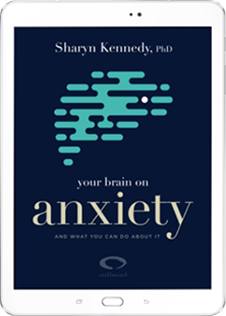This website uses cookies so that we can provide you with the best user experience possible. Cookie information is stored in your browser and performs functions such as recognising you when you return to our website and helping our team to understand which sections of the website you find most interesting and useful.
Do you feel anxiety all the time? Do you feel scared? Have you ever tried to force yourself to think positively? You’re not alone. You don’t have to feel that way.
 - Dr. Sharyn Kennedy, PhD
- Dr. Sharyn Kennedy, PhD
Your Anxiety Is Real and It Can Get Better
Do you feel bad all the time? Do you feel scared? Have you ever tried to force yourself to think positively? Have you tried to argue logically with your thoughts and feelings?
Have you tried to ignore those thoughts and feelings to concentrate on the things you need to do? Have you tried to find things to do to distract yourself from how you feel? Do you often ask yourself if your anxiety is real?
Everyone experiences some anxiety, and it can be challenging to know the difference between everyday anxiety and clinical anxiety. In general, the difference is in the frequency and extremes of negative thoughts and behaviors.
Clinical anxiety can only be diagnosed by a professional, but if you frequently find yourself with the following symptoms, you should consult a professional.
- Difficulty breathing
- Feeling faint or dizzy
- Clenching your fists
- Fearing disapproval or criticism
- Difficulty concentrating or racing thoughts
- Endless worrying
- Tightness or tension
- A sense of being stuck
If that’s you, you’re not alone. You’re not broken. You don’t have to feel that way. Your anxiety is lying to you.
When you experience the things that cause anxiety—criticism, conflict, or anything that goes wrong—it triggers an automatic response from your reptilian brain. With clinical anxiety, the thresholds for those triggers are lower, and every criticism, conflict, or problem seems insoluble.
They are not. The first step is to take control back from your reptilian brain, engage your reasoning brain, and put things in their proper perspective.
We call that Cognitive Behavioral Therapy. It’s one of the first things you’ll learn in my course or if you come to me in private practice and it can help you live a better life.
Anxiety can often produce negative thoughts that affect our behavior. We think we’re not good enough, so we don’t even try. We think we’re not good at relationships, so we give up and think we’re destined to live alone. These thoughts feel like facts, but often they are lies. An essential step in changing how you think is to question the truthfulness of these thoughts.
We all experience Automatic Thoughts, and the process of CBT is the process of interrupting and analyzing those thoughts so you can retrain your brain to respond differently in anxiety-causing situations.
Anxiety is built on the habit of perceiving certain events in the worst possible way. If you can break that habit, you can live a much better life. To do that, you must first listen to what you’re thinking. Because habitual behaviors often happen in the background, on auto-pilot, we’re not always aware of them. Becoming aware of them is paramount.
That doesn’t mean it’s easy. Our brains excel at taking shortcuts and this habit of emotional response is one of them. Forcing our brains to pay attention to what we’re doing is called Mindfulness, and it takes practice.
When you feel that anxiety building—again—there’s a simple four-step process you can use to interrupt it before the wave crashes over you and you feel helpless.
But before you can use these techniques in stressful situations, you have to practice them in non-stressful situations. If you don't, your brain will associate the technique with the feeling of anxiety and things will get worse.
Your brain wants to help you. Have you noticed that you avoid certain situations or people? That’s likely a mechanism your brain has developed to reduce the frequency or intensity of instance of anxiety. The problem is that you cannot avoid anxiety triggers altogether. Someone will always disagree with you. Problems will always crop up. If you’re going to get rid of the pain, you can’t simply avoid the situations that cause it.
That said, one of the most common symptoms of anxiety is the feeling that you can’t accomplish anything useful. Also, one of the most stressful things we experience is being forced to do things that we have little experience with, or are not very good at. It’s worth reminding yourself of the things you are good at, and when anxiety hits, it’s worth asking if you can address the situation with a strength rather than a weakness.




